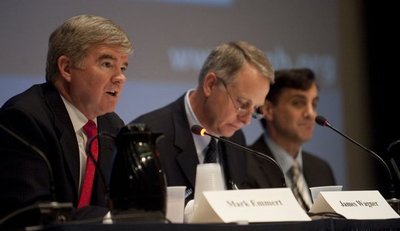October 1, 2009
UW plays leading role in Consortium of Universities for Global Health

UW President Mark Emmert (left) with presidents James W. Wagner of Emory University and Ronald J. Daniels of Johns Hopkins University, at a Sept. 14 panel discussion on the role of universities and global health. Bobbi Nodell / News & Community Relations
At the first annual meeting of the Consortium of Universities for Global Health Sept. 14-16 in Bethesda, Md., it was clear that global health was not a fad — that universities were planning on a playing a huge role to match the surge in student interest.
UW President Mark Emmert, participating in a panel discussion with four other university presidents (Boston University, Duke, Emory, Johns Hopkins), said global health today is what civil rights was to baby boomers.
“Our generation said we don’t want to live in a nation that has different rights for people. Our students seem to be saying we don’t want to live in a planet where people have different rights,” he said.
Emmert said he hoped the University’s legacy will be how today’s current students, when they are middle-aged, will look back at their college years and say, “We really had a material impact on changing the planet.”
UW is playing a leading role in the Consortium of Universities for Global Health and Emmert coordinated a statement signed by eight university presidents — from BU, Duke, Emory, Johns Hopkins, University of Washington, McGill University, Stanford University, and the University of California — urging the United States to use the resources of universities to respond to global health needs and support a new generation of global health workers. “Virtually the entire range of university expertise is now engaged in addressing the global disparities in health and development,” the statement reads.
According to a survey by the consortium, the number of students enrolled in global health programs in universities across the United States and Canada doubled in just three years due to a surging interest in careers to address health disparities and prevent the spread of disease in developing countries.
The 37 universities who responded to the survey are involved in a combined 302 programs that have been in place for at least one year in 97 countries.
The consortium’s first meeting was held at the National Institutes of Health, drawing 250 representatives from 58 universities. Several top U.S. health officials spoke as well, including Dr. Francis Collins, director of the NIH, Dr. Ezekiel Emanuel, special advisor on health policy, Office of Management and Budget; and Ambassador Eric Goosby, MD, U.S. Global AIDS Coordinator.
The overwhelming message from the conference was that solving some of the world’s most complex problems is a priority not only among universities but with the U.S. government.
Collins talked about how global health is one of the top five priorities for NIH. Dr. Emanuel (Rahm Emanuel’s brother), discussed about the huge U.S. commitment to global health ($63 billion for 2009-2014 up from $27 billion from 2003-2008).
During the presidents’ panel discussion, the presidents noted the struggle now for universities is defining what global health is not and breaking down barriers to working across disciplines. Making global health local and getting more students interested in serving local communities was also a dominant theme.
Following the meeting, Consortium representatives participated in a Congressional briefing sponsored by the CSIS Global Health Policy Center and the Congressional Global Health Caucus.
For more on the meeting, including survey results, videos, and press coverage, go to www.cugh.org.


